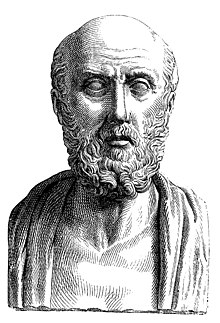Portal:History of science
The History of Science Portal
The history of science covers the development of science from ancient times to the present. It encompasses all three major branches of science: natural, social, and formal. Protoscience, early sciences, and natural philosophies such as alchemy and astrology during the Bronze Age, Iron Age, classical antiquity, and the Middle Ages declined during the early modern period after the establishment of formal disciplines of science in the Age of Enlightenment.
Science's earliest roots can be traced to Ancient Egypt and Mesopotamia around 3000 to 1200 BCE. These civilizations' contributions to mathematics, astronomy, and medicine influenced later Greek natural philosophy of classical antiquity, wherein formal attempts were made to provide explanations of events in the physical world based on natural causes. After the fall of the Western Roman Empire, knowledge of Greek conceptions of the world deteriorated in Latin-speaking Western Europe during the early centuries (400 to 1000 CE) of the Middle Ages, but continued to thrive in the Greek-speaking Byzantine Empire. Aided by translations of Greek texts, the Hellenistic worldview was preserved and absorbed into the Arabic-speaking Muslim world during the Islamic Golden Age. The recovery and assimilation of Greek works and Islamic inquiries into Western Europe from the 10th to 13th century revived the learning of natural philosophy in the West. Traditions of early science were also developed in ancient India and separately in ancient China, the Chinese model having influenced Vietnam, Korea and Japan before Western exploration. Among the Pre-Columbian peoples of Mesoamerica, the Zapotec civilization established their first known traditions of astronomy and mathematics for producing calendars, followed by other civilizations such as the Maya.
Natural philosophy was transformed during the Scientific Revolution in 16th- to 17th-century Europe, as new ideas and discoveries departed from previous Greek conceptions and traditions. The New Science that emerged was more mechanistic in its worldview, more integrated with mathematics, and more reliable and open as its knowledge was based on a newly defined scientific method. More "revolutions" in subsequent centuries soon followed. The chemical revolution of the 18th century, for instance, introduced new quantitative methods and measurements for chemistry. In the 19th century, new perspectives regarding the conservation of energy, age of Earth, and evolution came into focus. And in the 20th century, new discoveries in genetics and physics laid the foundations for new sub disciplines such as molecular biology and particle physics. Moreover, industrial and military concerns as well as the increasing complexity of new research endeavors ushered in the era of "big science," particularly after World War II. (Full article...)
Selected article -

Deutsche Physik (German: [ˈdɔʏtʃə fyˈziːk], lit. "German Physics") or Aryan Physics (German: Arische Physik) was a nationalist movement in the German physics community in the early 1930s which had the support of many eminent physicists in Germany. The term was taken from the title of a four-volume physics textbook by Nobel laureate Philipp Lenard in the 1930s.
Deutsche Physik was opposed to the work of Albert Einstein and other modern theoretically based physics, which was disparagingly labeled "Jewish physics" (German: Jüdische Physik). (Full article...)
Selected image

In this set of drawings from 1616, Galileo Galilei recorded the uneven curve of the Sun's light along the lunar surface, indicating variations in elevation. Galileo's telescope observations of the Moon and other heavenly bodies helped to convince 17th century scholars to abandon the notion of the heavens as perfect and unchanging. Before the rise of telescopic observations, the Moon was still considered by some Jesuit astronomers to be flat, with the visible spots caused by variations in density or optical phenomena. Galileo had planned a more extensive program of observations and illustrations, finding little resistance to a rough Moon, made no further lunar drawings after these.
Did you know
...that Einstein's famous letter to FDR about the possibility of an atomic bomb was actually written by Leó Szilárd?
...that geology was transformed in the latter part of the 20th century after widespread acceptance of plate tectonics?
...that the idea of biological evolution dates to the ancient world?
Selected Biography -
Hippocrates of Kos (/hɪˈpɒkrətiːz/, Ancient Greek: Ἱπποκράτης ὁ Κῷος, romanized: Hippokrátēs ho Kôios; c. 460 – c. 370 BC), also known as Hippocrates II, was a Greek physician and philosopher of the classical period who is considered one of the most outstanding figures in the history of medicine. He is traditionally referred to as the "Father of Medicine" in recognition of his lasting contributions to the field, such as the use of prognosis and clinical observation, the systematic categorization of diseases, and the (however misguided) formulation of humoral theory. The Hippocratic school of medicine revolutionized ancient Greek medicine, establishing it as a discipline distinct from other fields with which it had traditionally been associated (theurgy and philosophy), thus establishing medicine as a profession.
However, the achievements of the writers of the Hippocratic Corpus, the practitioners of Hippocratic medicine, and the actions of Hippocrates himself were often conflated; thus very little is known about what Hippocrates actually thought, wrote, and did. Hippocrates is commonly portrayed as the paragon of the ancient physician and credited with coining the Hippocratic Oath, which is still relevant and in use today. He is also credited with greatly advancing the systematic study of clinical medicine, summing up the medical knowledge of previous schools, and prescribing practices for physicians through the Hippocratic Corpus and other works. (Full article...)
Selected anniversaries
- 1642 - Birth of Sir Isaac Newton, English physicist and mathematician (d. 1727)
- 1763 - Birth of Claude Chappe, French telecommunications pioneer (d. 1805)
- 1765 - Death of Václav Prokop Diviš, Czech theologian and natural scientist (b. 1698)
- 1868 - Death of Linus Yale, Jr., American mechanical engineer and inventor (b. 1821)
- 1876 - Birth of Adolf Otto Reinhold Windaus, Nobel laureate (d. 1959)
- 1904 - Birth of Gerhard Herzberg, Nobel Prize laureate (d. 1999)
- 1906 - Birth of Ernst Ruska, Nobel laureate (d. 1988)
- 1993 - Death of Pierre Victor Auger, French physicist (b. 1899)
Related portals
Topics
General images
Subcategories
Things you can do
Help out by participating in the History of Science Wikiproject (which also coordinates the histories of medicine, technology and philosophy of science) or join the discussion.
Associated Wikimedia
The following Wikimedia Foundation sister projects provide more on this subject:
-
Commons
Free media repository -
Wikibooks
Free textbooks and manuals -
Wikidata
Free knowledge base -
Wikinews
Free-content news -
Wikiquote
Collection of quotations -
Wikisource
Free-content library -
Wikiversity
Free learning tools -
Wiktionary
Dictionary and thesaurus









































































